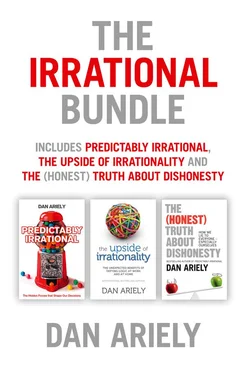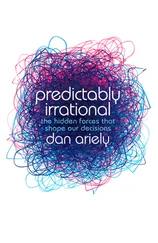Dan Ariely - The Irrational Bundle
Здесь есть возможность читать онлайн «Dan Ariely - The Irrational Bundle» — ознакомительный отрывок электронной книги совершенно бесплатно, а после прочтения отрывка купить полную версию. В некоторых случаях можно слушать аудио, скачать через торрент в формате fb2 и присутствует краткое содержание. Жанр: unrecognised, на английском языке. Описание произведения, (предисловие) а так же отзывы посетителей доступны на портале библиотеки ЛибКат.
- Название:The Irrational Bundle
- Автор:
- Жанр:
- Год:неизвестен
- ISBN:нет данных
- Рейтинг книги:3 / 5. Голосов: 1
-
Избранное:Добавить в избранное
- Отзывы:
-
Ваша оценка:
- 60
- 1
- 2
- 3
- 4
- 5
The Irrational Bundle: краткое содержание, описание и аннотация
Предлагаем к чтению аннотацию, описание, краткое содержание или предисловие (зависит от того, что написал сам автор книги «The Irrational Bundle»). Если вы не нашли необходимую информацию о книге — напишите в комментариях, мы постараемся отыскать её.
The Irrational Bundle — читать онлайн ознакомительный отрывок
Ниже представлен текст книги, разбитый по страницам. Система сохранения места последней прочитанной страницы, позволяет с удобством читать онлайн бесплатно книгу «The Irrational Bundle», без необходимости каждый раз заново искать на чём Вы остановились. Поставьте закладку, и сможете в любой момент перейти на страницу, на которой закончили чтение.
Интервал:
Закладка:
We should also pay particular attention to the first decision we make in what is going to be a long stream of decisions (about clothing, food, etc.). When we face such a decision, it might seem to us that this is just one decision, without large consequences; but in fact the power of the first decision can have such a long-lasting effect that it will percolate into our future decisions for years to come. Given this effect, the first decision is crucial, and we should give it an appropriate amount of attention.
Socrates said that the unexamined life is not worth living. Perhaps it’s time to inventory the imprints and anchors in our own life. Even if they once were completely reasonable, are they still reasonable? Once the old choices are reconsidered, we can open ourselves to new decisions—and the new opportunities of a new day. That seems to make sense.
ALL THIS TALK about anchors and goslings has larger implications than consumer preferences, however. Traditional economics assumes that prices of products in the market are determined by a balance between two forces: production at each price (supply) and the desires of those with purchasing power at each price (demand). The price at which these two forces meet determines the prices in the marketplace.
This is an elegant idea, but it depends centrally on the assumption that the two forces are independent and that together they produce the market price. The results of all the experiments presented in this chapter (and the basic idea of arbitrary coherence itself) challenge these assumptions. First, according to the standard economic framework, consumers’ willingness to pay is one of the two inputs that determine market prices (this is the demand). But as our experiments demonstrate, what consumers are willing to pay can easily be manipulated, and this means that consumers don’t in fact have a good handle on their own preferences and the prices they are willing to pay for different goods and experiences.
Second, whereas the standard economic framework assumes that the forces of supply and demand are independent, the type of anchoring manipulations we have shown here suggest that they are, in fact, dependent. In the real world, anchoring comes from manufacturer’s suggested retail prices (MSRPs), advertised prices, promotions, product introductions, etc.—all of which are supply-side variables. It seems then that instead of consumers’ willingness to pay influencing market prices, the causality is somewhat reversed and it is market prices themselves that influence consumers’ willingness to pay. What this means is that demand is not, in fact, a completely separate force from supply.
AND THIS IS not the end of the story. In the framework of arbitrary coherence, the relationships we see in the marketplace between demand and supply (for example, buying more yogurt when it is discounted) are based not on preferences but on memory. Here is an illustration of this idea. Consider your current consumption of milk and wine. Now imagine that two new taxes will be introduced tomorrow. One will cut the price of wine by 50 percent, and the other will increase the price of milk by 100 percent. What do you think will happen? These price changes will surely affect consumption, and many people will walk around slightly happier and with less calcium. But now imagine this. What if the new taxes are accompanied by induced amnesia for the previous prices of wine and milk? What if the prices change in the same way, but you do not remember what you paid for these two products in the past?
I suspect that the price changes would make a huge impact on demand if people remembered the previous prices and noticed the price increases; but I also suspect that without a memory for past prices, these price changes would have a trivial effect, if any, on demand. If people had no memory of past prices, the consumption of milk and wine would remain essentially the same, as if the prices had not changed. In other words, the sensitivity we show to price changes might in fact be largely a result of our memory for the prices we have paid in the past and our desire for coherence with our past decisions—not at all a reflection of our true preferences or our level of demand.
The same basic principle would also apply if the government one day decided to impose a tax that doubled the price of gasoline. Under conventional economic theory, this should cut demand. But would it? Certainly, people would initially compare the new prices with their anchor, would be flabbergasted by the new prices, and so might pull back on their gasoline consumption and maybe even get a hybrid car. But over the long run, and once consumers readjusted to the new price and the new anchors (just as we adjust to the price of Nike sneakers, bottled water, and everything else), our gasoline consumption, at the new price, might in fact get close to the pretax level. Moreover, much as in the example of Starbucks, this process of readjustment could be accelerated if the price change were to also be accompanied by other changes, such as a new grade of gas, or a new type of fuel (such as corn-based ethanol fuel).
I am not suggesting that doubling the price of gasoline would have no effect on consumers’ demand. But I do believe that in the long term, it would have a much smaller influence on demand than would be assumed from just observing the short-term market reactions to price increases.
ANOTHER IMPLICATION OF arbitrary coherence has to do with the claimed benefits of the free market and free trade. The basic idea of the free market is that if I have something that you value more than I do—let’s say a sofa—trading this item will benefit both of us. This means that the mutual benefit of trading rests on the assumption that all the players in the market know the value of what they have and the value of the things they are considering getting from the trade.
But if our choices are often affected by random initial anchors, as we observed in our experiments, the choices and trades we make are not necessarily going to be an accurate reflection of the real pleasure or utility we derive from those products. In other words, in many cases we make decisions in the marketplace that may not reflect how much pleasure we can get from different items. Now, if we can’t accurately compute these pleasure values, but frequently follow arbitrary anchors instead, then it is not clear that the opportunity to trade is necessarily going to make us better off. For example, because of some unfortunate initial anchors we might mistakenly trade something that truly gives us a lot of pleasure (but regrettably had a low initial anchor) for something that gives us less pleasure (but owing to some random circumstances had a high initial anchor). If anchors and memories of these anchors—but not preferences—determine our behavior, why would trading be hailed as the key to maximizing personal happiness (utility)?
SO, WHERE DOES this leave us? If we can’t rely on the market forces of supply and demand to set optimal market prices, and we can’t count on free-market mechanisms to help us maximize our utility, then we may need to look elsewhere. This is especially the case with society’s essentials, such as health care, medicine, water, electricity, education, and other critical resources. If you accept the premise that market forces and free markets will not always regulate the market for the best, then you may find yourself among those who believe that the government (we hope a reasonable and thoughtful government) must play a larger role in regulating some market activities, even if this limits free enterprise. Yes, a free market based on supply, demand, and no friction would be the ideal if we were truly rational. Yet when we are not rational but irrational, policies should take this important factor into account.
Читать дальшеИнтервал:
Закладка:
Похожие книги на «The Irrational Bundle»
Представляем Вашему вниманию похожие книги на «The Irrational Bundle» списком для выбора. Мы отобрали схожую по названию и смыслу литературу в надежде предоставить читателям больше вариантов отыскать новые, интересные, ещё непрочитанные произведения.
Обсуждение, отзывы о книге «The Irrational Bundle» и просто собственные мнения читателей. Оставьте ваши комментарии, напишите, что Вы думаете о произведении, его смысле или главных героях. Укажите что конкретно понравилось, а что нет, и почему Вы так считаете.












